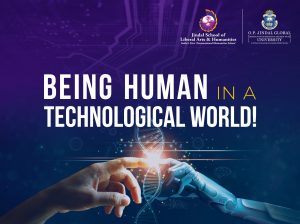It is often at the cusp of different perspectives that the greatest discoveries, innovations and solutions are found. The brilliant Leonardo da Vinci was an epic exemplar of the capability of the human mind to transcend boundaries in the pursuit of curiosity and creation. He is known as famously for his artistic work as for his thoughts on engineering, technology, anatomy, astronomy, architecture and so much more. The “Renaissance Man” married art and science in a way that was perhaps unprecedented. Through the likes of da Vinci, history has time and again validated the importance of interdisciplinarity. Yet there has been growing concern that the education system, particularly in developing countries like India, has systematically separated the connections between different perspectives – compartmentalised disciplines.
The idea of holistic learning is at its core interred with interdisciplinarity. But as subjects evolved, delving deeper into the development of their unique fields, somewhere along the way, methods of teaching and learning became a little more rigid, less fluid. Perhaps in the quest for super specialisations, or even to an extent, to make students more employable in their chosen paths.
But what constitutes employability today? Can disciplinary knowledge alone cover the breadth of possibilities that this modern world beholds? And perhaps, most importantly – are students able to make the most of their education? The answers to these questions, just as the nature of learning and knowledge, are constantly evolving. The lines between disciplines blur in a world that’s grown more interconnected than ever before.
Yet for far too long, the Indian education system has kept disciplines distanced from each other. Beginning from early childhood to higher education, learning traditionally takes place in silos. High school and undergraduate students are typically required to choose between streams and subjects. As teenagers, they carry the weight of decisions that could direct, change and even narrow their futures.
It’s a tall task to ask of young people in their formative years. Years that could be better spent exploring their options, discovering interests, learning as much as possible, absorbing a more holistic worldview that will enable them to grow into well-rounded, open-minded, sensitive and intelligent young adults.
All that is about to change. At least, that is what the revolutionary National Education Policy (NEP) 2020 claims. As we stand on the verge of a breakthrough reform, the NEP promises a bold change. One that espouses interdisciplinarity in its very core. The breaking down of disciplinary boundaries is a big leap from traditional learning frameworks. Systematically restructuring the way learning has taken place for decades, even centuries, the NEP demands educators, policy makers, and students to step up and brace themselves for change, even if it will come slowly.
Coming from a time when academic disciplines don’t speak to each other, creating interdisciplinary curriculum, effective pedagogy, skilling teachers, among others, will be milestones to look forward to as India revamps itself to tap into the potential of interdisciplinarity.
It will challenge young people to embark on academic pursuits with more freedom, imagination and abandon than ever before. Looking at life through a multidisciplinary lens will result in the ability to approach problems from a broader perspective. And that’s just what’s needed today.
If you think about the most burning issues of the contemporary world – climate change, sustainability, inequality, poverty, justice, human rights, international relations, conflict, war and peace – their solutions cannot be located simply within a singular field. The “real world” which we, as educators, prepare our students to enter, is complex. And it’s in the interplay between disciplines that we can find holistic answers. We must therefore equip students to live successfully amidst the dynamic realities of the world, by inspiring creativity, innovation and broader thinking. Armed with interdisciplinary learning, students can find their place in this ever-evolving world.
Contrary to traditional curricula that are designed to transform students into a cohort of specialised professionals with advanced knowledge in a particular domain, multidisciplinarity takes a different route to “employability”. Students gain an arsenal of skills that are easily transferable across different fields– problem-solving, critical thinking, team work, time management, strong communication, analysis and research methodologies, and much more – which equip them with the flexibility to choose their own path. In the rapidly changing and highly demanding modern context, traditional degrees tend to leave graduates wanting, whereas multidisciplinary talent has the power to overcome the challenges and conquer the possibilities of the future.
The push to consider the real world learning outcomes of interdisciplinarity has gained momentum globally over the past decades. It is firmly established at the world’s best universities like Harvard, Oxford, Yale, Stanford, Princeton, and so on. Yet in India, only a niche set of schools and universities have adopted this approach. At O.P. Jindal Global University, we have consciously held interdisciplinarity at the core of learning.
This means that students enrolled in each of the ten schools – law, business, international relations, liberal arts, architecture, journalism, public policy, banking, environment or psychology – take up foundational interdisciplinary courses within their schools, and also study cross-listed electives across the board. They also participate in interdisciplinary research alongside their peers and mentors. Faculty from diverse backgrounds and disciplines also come together to prepare interdisciplinary courses, which further enriches the value of interdisciplinarity throughout the institutional culture.
Multidisciplinarity is important for a number of reasons. It not only exposes students to new and diverse disciplines, thoughts or perspectives, but helps them discover what interests them, and how to contextualise their specialised areas of study with other disciplines.
As students prepare to enter a world that is increasingly multifaceted itself, interdisciplinarity can no longer be overlooked in the classroom. So its inclusion as a central goal of the NEP is not only welcome in the academic world, but overdue. It remains to be seen if the policy can revolutionise the education system. In the end, disciplinarity and interdisciplinarity must go hand-in-hand. So that students may not only gain knowledge during their academic life but nurture a holistic outlook that sets the tone for lifelong learning.


